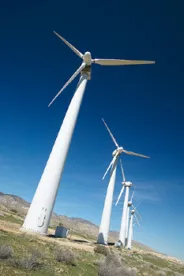Background
The French Energy Regulation Committee (CRE) on 11 July 2011 issued a set of rules, “Specifications of tender No. 2011/S 126-208873 on offshore wind power generation facilities in France”, that outlines the terms and conditions of the new tender process applicable to offshore wind projects off the French coasts.
The new tender regime will facilitate the commission of wind turbines off the French coast, representing a total capacity of 6,000 MW. The project is part of a larger scheme to bring the level of renewable energy up to 23 per cent of the overall energy consumed in France by 2020.
Timing of the new tender process
As a first step, the French authorities have identified five sites on the north east coast, representing an overall capacity of 3,000 MW (each site is likely to produce between 500 and 750 MW).
Bidders are invited to file an application with the CRE for one or more of the sites by 11 January 2012. Joint applications by several bidders are accepted.
Although the CRE is in charge of the bidding process (i.e., receiving, reviewing and rating applications), the final decision on selection, which is expected in April 2012, belongs to the Ministry for Ecology, Sustainable Development, Transport and Housing and the Ministry for the Economy, Finance and Industry.
Following the selection of the bidders, environmental and feasibility studies must be carried out. Bidders will also have to apply for and obtain from local authorities an authorisation to occupy public areas. In principle, although not common in practice, the public authorities can withdraw this authorisation for public interest reasons, subject to indemnification of the holder of the authorisation for the consequences of such withdrawal.
It is expected that construction of the wind farms will commence in early 2015.
Timing of Commission
Selected bidders will commission the power production facilities according to the following timetable:
- Tranche 1: bidders undertake to commission at least 20 per cent of the entire power production facility within six years of the notification of the decision by the competent authorities.
- Tranche 2: bidders undertake to commission at least 50 per cent of the entire power production facility within seven years of notification of the decision by the competent authorities.
- Tranche 3: bidders undertake to commission the entire power production facility no later than eight years after the notification of the decision by the competent authorities.
A power purchase agreement for each tranche will be entered into with EDF (the state-owned electricity provider), pursuant to which EDF undertakes to purchase the electricity produced by the facility. The term of the power purchase agreement of each tranche is 20 years from the date of commissioning.
Tender application
Each application will be allocated a number of points on the basis of three criteria: price, industrial project, research and development, and environmental impact. The highest scoring bidders will be selected.
Price is a key criterion as it will determine the price at which EDF will purchase the electricity produced by the facility during the entire term of the power purchase agreements. It will take into account all costs related to the studies, the implementation, the operation and the decommissioning of the facilities. Scoring will depend on how the proposed price compares with a minimum and a maximum price set by the authorities for each site.
In the industrial project, the bidders must set forth: (i) a plan to secure the supply of critical components, (ii) the estimated employment situation, and (iii) the identity of their suppliers or partners.
The bidders must outline how their project contributes to innovation in wind energy through research and development efforts.
Finally, the bidders are expected to propose measures to reduce and/or offset
the project’s impact on the environment.
Financial guarantees
The tender regime was clearly designed to favour large and financially strong companies. One requirement is that the shareholders’ equity in a bidder (and/or its controlling entities) be no less than 20 per cent of the total amount of the investment.
Performance Guarantees
Bidders must provide first demand guarantees, issued in favour of the French authorities, by a bank approved by the Minister for the Economy or by credit institutions and investment firms with a rating credit of at least A, A2 or equivalent, issued by a first class rating agency.
For the studies and preliminary construction works, bidders must provide a first demand guarantee equivalent to €10,000 per MW installed. This guarantee is subject annually to partial and successive releases, depending on the completion of the relevant obligations.
For the studies and works leading to the commissioning, bidders must provide a first demand guarantee equivalent to €50,000 per MW installed. This guarantee must be fully released upon full commissioning of the facility.
Guarantees for Decommissioning
Bidders must provide financial guarantees to cover the costs of decommissioning and site rehabilitation after operation. The guarantee can not be less than €50,000 per MW installed and can be in the form of
- Joint and several guarantees issued by a credit institution or an insurance company
-
And/or a deposit posted as security on an account opened in the books of the French Deposit and Consignment Office (Caisse des dépôts).
The financial guarantees are maintained throughout the operational life of the facility.
As of today, a number of international companies have expressed publicly an interest in this new tender regime, including Iberdrola (who intends to file an application on two of the five sites), Alstom, Dong Energy, EDF Energies Nouvelles and GDF Suez, Vinci and Areva (who intend to jointly file an application on three of the five sites).





 />i
/>i

